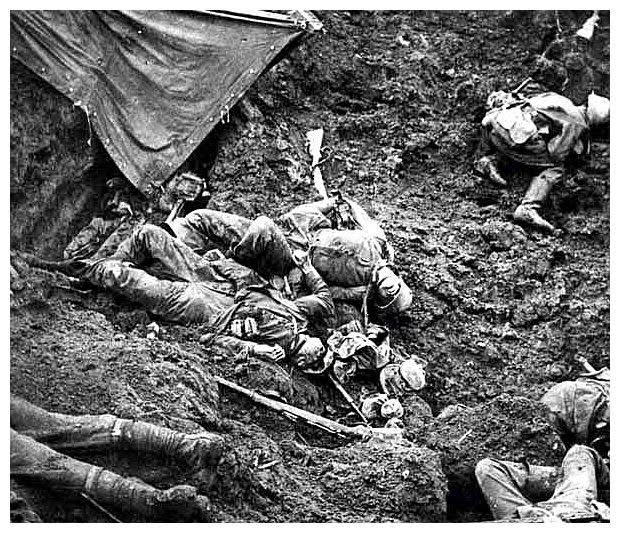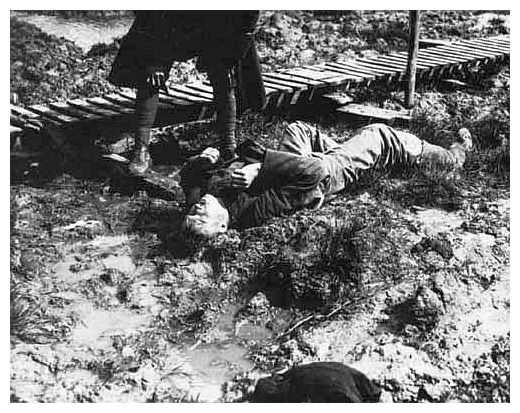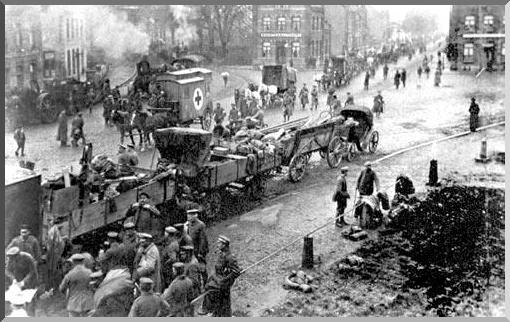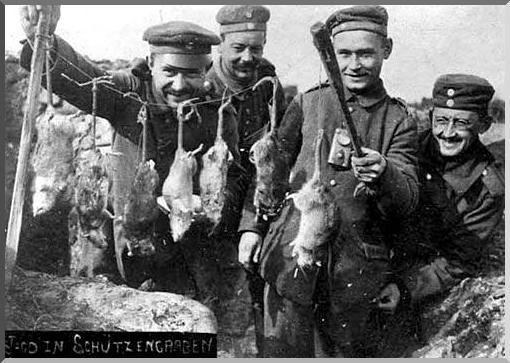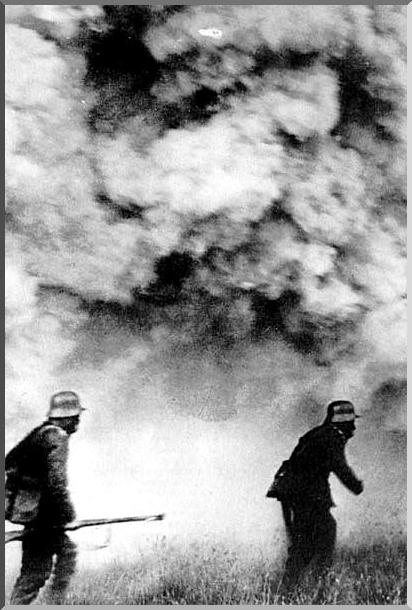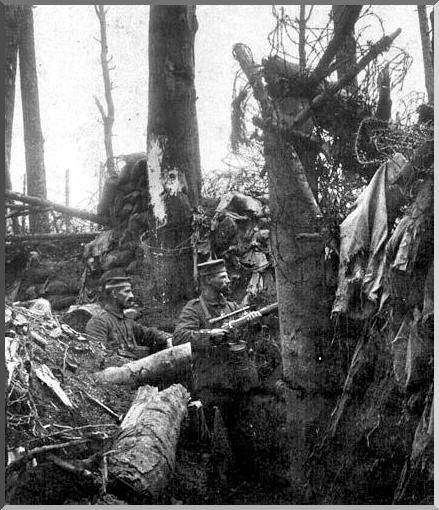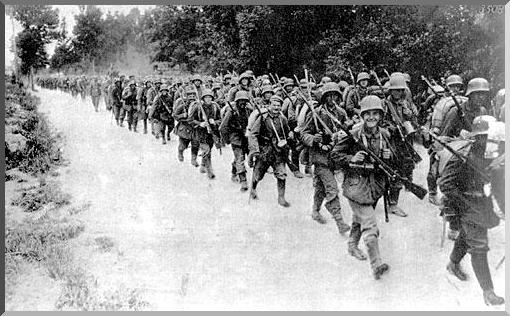Argentina, Chile, Denmark, The Netherlands, Norway, Spain, Venezuela, Sweden and Switzerland.
Only these countries were neutral during the Great War 1914-1918. The rest of the world conducted war with each other.
Following the adage that he who wants peace prepares for war, the small Dutch army exercised continuously. In the East Holland bordered to Germany and in the south to German-occupied Belgium. The heavy gunfire in Flanders was heard in Holland every day. The Belgian battlefields were no more than 40 km's away (about 26 miles).
 The Dutch mobile artillery corps crosses a brook in the southern province of Brabant. 1914
The Dutch mobile artillery corps crosses a brook in the southern province of Brabant. 1914
When the war broke out more than one million Belgian refugees fled to Holland. Thousands of soldiers, from both sides, followed them. They crossed the border because the enemy had them encircled, like it happened to 2,000 British marines at Antwerp.
 Disarmement of German infantry troops who fled across the border to the Netherlands
Disarmement of German infantry troops who fled across the border to the Netherlands
All foreign soldiers arriving in The Netherlands were disarmed and interned in camps where they were to stay during rest of the war. The German soldiers called this place the graveyard, because of the bayonets that were put into the ground.
The Dutch government had mobilized 500.000 man to reinforce the regular army. They guarded the borders and filled their days with exercising and polishing...
 Mobile pigeon station
Mobile pigeon station
There were many incidents in which war-countries were involved. England for instance, bombed - by accident - the Dutch port of Zierikzee.
And German U-boats torpedoed and sank many Dutch ships - even one that transported German prisoners-of-war from England to the Netherlands.
In spring 1915 the Germans erected an dreadful electric fence between occupied Belgium and the Netherlands. The 2,000 Volts wire ran almost 200 Km (125 Miles) long through villages, orchards, meadows, woodland, over brooks - even over the river Meuse. The height of the construction was over 3 meters. How many people the fence killed is unknown. Estimates vary from 2,000 to 3,000.
The word neutral comes from ne uter (=none of both), but in the Netherlands making a choice was a near thing: commander-in-chief General C.J. Snijders had a strong liking for the 'invincible' Germany.
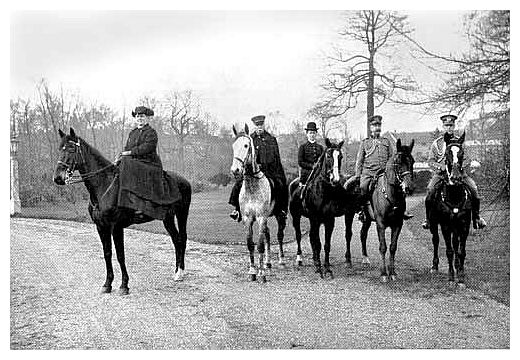 Dutch queen Wilhelmina on horseback, observing a military exercise
Dutch queen Wilhelmina on horseback, observing a military exercise
Because of his attitude the government several times tried to get rid of the general, but Queen Wilhelmina kept on backing her CIC. The queen was fond of the army and often visited the troops and observed exercises.
 Dutch navy men defuse mines washed ashore
Dutch navy men defuse mines washed ashore
To maintain neutrality the Netherlands laid mines in coastal waters, to prevent hostile landings.
Three times (in 1916, 1917 and 1918) Germany considered occupying the Netherlands. In that case the allied countries without doubt would have invaded the country from the seaside.
Germany eventually refrained from invading Holland, also because of the food supplies that continuously flowed from this country. This trade made some merchants in Holland very rich. They were called OW'ers, meaning 'oorlogswinst-makers': war-profiteers. Until this very day OW'er is considered a harsh term of abuse in Holland.
In the Netherlands there are some cemeteries where victims of the Great War are buried. Many were sailors who fell at sea. Others are civilians or navy-personnel who died at the beaches where countless mines washed ashore.
Many people still bore a grudge to England because of the Boer War, fifteen years earlier, when thousands of Boers (Dutch descendants) in South-Africa had been killed by British soldiers.
Only these countries were neutral during the Great War 1914-1918. The rest of the world conducted war with each other.
Following the adage that he who wants peace prepares for war, the small Dutch army exercised continuously. In the East Holland bordered to Germany and in the south to German-occupied Belgium. The heavy gunfire in Flanders was heard in Holland every day. The Belgian battlefields were no more than 40 km's away (about 26 miles).
 The Dutch mobile artillery corps crosses a brook in the southern province of Brabant. 1914
The Dutch mobile artillery corps crosses a brook in the southern province of Brabant. 1914When the war broke out more than one million Belgian refugees fled to Holland. Thousands of soldiers, from both sides, followed them. They crossed the border because the enemy had them encircled, like it happened to 2,000 British marines at Antwerp.
 Disarmement of German infantry troops who fled across the border to the Netherlands
Disarmement of German infantry troops who fled across the border to the NetherlandsAll foreign soldiers arriving in The Netherlands were disarmed and interned in camps where they were to stay during rest of the war. The German soldiers called this place the graveyard, because of the bayonets that were put into the ground.
The Dutch government had mobilized 500.000 man to reinforce the regular army. They guarded the borders and filled their days with exercising and polishing...
 Mobile pigeon station
Mobile pigeon stationThere were many incidents in which war-countries were involved. England for instance, bombed - by accident - the Dutch port of Zierikzee.
And German U-boats torpedoed and sank many Dutch ships - even one that transported German prisoners-of-war from England to the Netherlands.
In spring 1915 the Germans erected an dreadful electric fence between occupied Belgium and the Netherlands. The 2,000 Volts wire ran almost 200 Km (125 Miles) long through villages, orchards, meadows, woodland, over brooks - even over the river Meuse. The height of the construction was over 3 meters. How many people the fence killed is unknown. Estimates vary from 2,000 to 3,000.
The word neutral comes from ne uter (=none of both), but in the Netherlands making a choice was a near thing: commander-in-chief General C.J. Snijders had a strong liking for the 'invincible' Germany.
 Dutch queen Wilhelmina on horseback, observing a military exercise
Dutch queen Wilhelmina on horseback, observing a military exercise Because of his attitude the government several times tried to get rid of the general, but Queen Wilhelmina kept on backing her CIC. The queen was fond of the army and often visited the troops and observed exercises.
 Dutch navy men defuse mines washed ashore
Dutch navy men defuse mines washed ashoreTo maintain neutrality the Netherlands laid mines in coastal waters, to prevent hostile landings.
Three times (in 1916, 1917 and 1918) Germany considered occupying the Netherlands. In that case the allied countries without doubt would have invaded the country from the seaside.
Germany eventually refrained from invading Holland, also because of the food supplies that continuously flowed from this country. This trade made some merchants in Holland very rich. They were called OW'ers, meaning 'oorlogswinst-makers': war-profiteers. Until this very day OW'er is considered a harsh term of abuse in Holland.
In the Netherlands there are some cemeteries where victims of the Great War are buried. Many were sailors who fell at sea. Others are civilians or navy-personnel who died at the beaches where countless mines washed ashore.
Many people still bore a grudge to England because of the Boer War, fifteen years earlier, when thousands of Boers (Dutch descendants) in South-Africa had been killed by British soldiers.




















